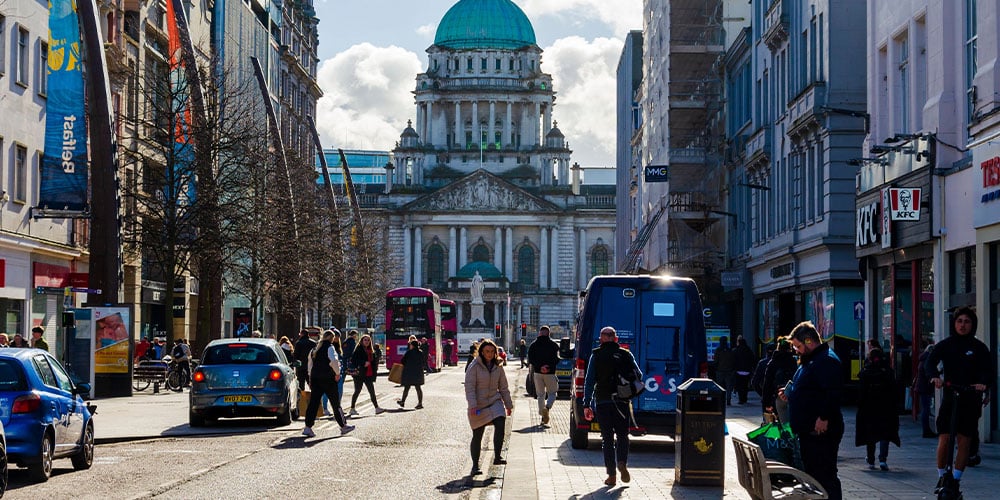-
Business Risk Services
Our Business Risk Services team deliver practical and pragmatic solutions that support clients in growing and protecting the inherent value of their businesses.
-
Consulting
Tailored consulting solutions that deliver measurable results through digital, regulatory and strategic transformation.
-
Corporate Finance and Deal Advisory
We offer a dedicated team of experienced individuals with a focus on successfully executing transactions for corporates and financial institutions. We offer an integrated approach, with our corporate finance specialists working seamlessly with tax and other specialists to ensure that every angle is covered.
-
Forensic Accounting
We have a different way of doing business by delivering real insight through a combination of technical rigour, commercial experience and intuitive judgment. We take pride in delivering responsive and tailored solutions to all our clients, capitalising on the wealth of experience housed within our Belfast and wider Forensics team
-
Restructuring
We work with a wide variety of clients and stakeholders such as high street banks, private equity funds, directors, government agencies and creditors to implement solutions which provide the best possible outcomes.

-
 Article Changes to filing options and requirements at Companies HouseFrom April 2027, Companies House will require all UK entities to file digital accounts. Learn what’s changing and how to prepare for the new rules.
Article Changes to filing options and requirements at Companies HouseFrom April 2027, Companies House will require all UK entities to file digital accounts. Learn what’s changing and how to prepare for the new rules. -
 Article FRS 102 Periodic Review series: Small companiesExplore key changes to small company disclosures under FRS 102 Section 1A, including UK GAAP updates on leases, tax, going concern and related parties.
Article FRS 102 Periodic Review series: Small companiesExplore key changes to small company disclosures under FRS 102 Section 1A, including UK GAAP updates on leases, tax, going concern and related parties. -
 Audit and Assurance FRS 102 Periodic Review series: Other changesOn 27 March 2024, the Financial Reporting Council issued amendments to FRS 100 – 105 (known as GAAP, or Generally Accepted Accounting Practice), a suite of accounting standards applicable in the UK and Ireland. These are used by an estimated 3.4 million businesses in preparing their financial statements.
Audit and Assurance FRS 102 Periodic Review series: Other changesOn 27 March 2024, the Financial Reporting Council issued amendments to FRS 100 – 105 (known as GAAP, or Generally Accepted Accounting Practice), a suite of accounting standards applicable in the UK and Ireland. These are used by an estimated 3.4 million businesses in preparing their financial statements. -
 Article ID Verification: Economic Crime & Corporate Transparency Act 2023Companies House is introducing mandatory identity verification requirements for Directors and People with Significant Control (PSCs), as the next step towards full implementation of the Economic Crime and Corporate Transparency Act 2023.
Article ID Verification: Economic Crime & Corporate Transparency Act 2023Companies House is introducing mandatory identity verification requirements for Directors and People with Significant Control (PSCs), as the next step towards full implementation of the Economic Crime and Corporate Transparency Act 2023.
-
Corporate and International Tax
Northern Ireland businesses face further challenges as they operate in the only part of the UK that has a land border with a country offering a lower tax rate.
-
Employer Solutions
Our team specialises in remuneration and incentive planning and works closely with employers, shareholders and employees to ensure that business strategies are aligned and goals achieved in the most tax efficient, cost-effective manner.
-
Entrepreneur and Private Client Taxes
Our team of experienced advisors are on hand to guide you through any decision or transaction ranging from the establishment of new business ventures, to realising value on exit, to succession planning and providing for loved ones.
-
Global Mobility Services
Grant Thornton Ireland offer a different approach to managing global mobility. We have brought together specialists from our tax, global payroll, people and change and financial accounting teams across Ireland and Northern Ireland, while drawing on the knowledge and insights of our global network of over 143 offices of mobility professionals to provide you with a holistic approach to managing global mobility.
-
Outsourced Payroll
Our outsourced service provides valued service to over 150 separate PAYE schemes. These ranging from 1 to 1000 employees, working for micro, SME and global employers. The service is supported by the integrated network of tax and global mobility teams and the wider Grant Thornton network delivering a seamless service. Experienced staff deliver a personal service built around your business needs.
-
Tax Disputes and Investigations
Our Tax Disputes and Investigation team is made up of tax experts and former HMRC investigators who have years of experience in dealing with a variety of tax investigations. Our expertise and insight can guide you through all interactions, keeping your cost at a minimum while allowing you to continue with the day to day running of your business.
-
VAT and Indirect Taxes
At Grant Thornton (NI) LLP, our team helps Northern Ireland businesses manage their UK and global indirect tax risks which, as transactional taxes, can quickly become big liabilities.


I took part in a panel discussion at the excellent NI Hotel Federation Business Outlook Seminar just before Easter. It was an event that reflected on how far the sector has come in the 25 years that the NI Hotel Federation has been with us. Indeed, the industry has been transformed since 1999, investing over £1.5 billion and almost doubling the number of bedrooms. Hotels now support 10,000 jobs directly and a further 5,000 indirectly in related industries.
It is a success story that has potential for continued growth and further economic benefit to Northern Ireland. Encouragingly, there are nine live hotel projects underway which represent £100 million in investment. There are pipeline developments that, if realised, will add a further £200 million to this.
Perhaps it was the heady mix of the positivity in the room that day, the recent return of the NI Executive, on top of a very welcome letter from my gas supplier about price reductions, that took hold of me, but during that panel session I outed myself as being optimistic about our economic prospects. It was a genuine, albeit unnatural, sentiment for an economist. On the surface, there are reasons to be optimistic.
The labour market has continued to perform well, our exports are improving, and the mood music on NI as a destination for inward investment is upbeat. However, I knew I wouldn’t have to wait long for something to come along and restore my equilibrium. Newly released statistics on poverty here have served as a stark reminder of the economic challenges we face.
The annual Northern Ireland Poverty and Income Inequality report for 2022-2023 shows us that a quarter of children are living in ‘relative poverty’. Relative poverty is defined as an individual living in a household with an income below 60% of the UK median level in the year in question. Absolute poverty is where a household has an income below 60% of the UK median income as it was in 2010/11. For reference, the absolute poverty threshold for a couple with no children was an income of £347 per week before housing costs. A single person without children is considered to be in absolute poverty with an income of £232.
Working all this through reveals that 18% of individuals in Northern Ireland, or 349,000 people, are in relative poverty. Over the last ten years, the proportion of individuals in relative poverty before housing costs has fluctuated between a high of 22% in 2014/15 and lows of 16% in 2017/18 and 2021/22, while absolute poverty (BHC) generally decreased slowly from a high of 21% in 2013/14 to a low of 12% in 2020/21 before increasing slightly to the current position of 14% in 2022/23.
Children in poverty is a particularly concerning statistic. In 2021/22, 18% of children were considered to be living in relative poverty. Over the year to 2022/23, this has risen to 24%. That’s 109,000 children. More concerningly, there are about 27,000 children of this group living in what is called ‘food insecure households’ i.e. they have a risk of, or lack of access to, sufficient, varied food.
As I was writing this article, I recalled that I’ve written about our poverty statistics before. Looking back, I see I first did so in May 2016 and at various points since. Nothing has really changed during that time to alter the situation. As I wrote then, poverty imposes significant costs, not just in economic terms, but in human terms - educational attainment is lower, health suffers and potential is wasted.
Indeed, there is a life expectancy gap of 5 years for females and 7 years for males between our most and least deprived areas. It is difficult to fathom these statistics but unfortunately this is the situation we find ourselves in. With little prospect of any significant policy moves to alter It, I fear I’ll still be writing similarly downcast stories in the years to come.
Update your subscriptions for Grant Thornton publications and events.




